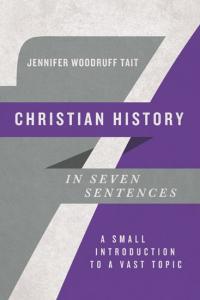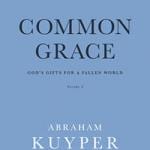With at least 2000 years under our belts (depending on what we do with the Old Testament), figuring out where to start learning about Christian history can be an overwhelming task. Should one start with the early church? (What about the book of Acts? Again, what about the Old Testament?) Maybe the Reformation, that seems to be a big transition? But then which Reformation–German? Swiss? English? Even the French side of it? Or maybe we should start with our own nation’s history and where Christianity ties in to it?

To help us out, Jennifer Woodruff Tait has written Christian History in Seven Sentences: A Small Introduction to a Vast Topic. Christian History in Seven Sentences (CHSS) focuses on seven moments in church history, builds a brief historical setting around them, and gives a short overview of what happens in those moments and why it matters. These moments include:
- The Edict of Milan (323)
- The Nicene Creed (325)
- The Rule of St. Benedict (530)
- The Schism between the Greek Orthodox and the Roman Catholics (1054)
- The Ninety-Five Theses (1517)
- The Edinburgh Conference (1910)
- Vatican II (1960s)
This book is well-written and accurate, and does provide a good starting point for the study of church history. It also raises an interesting question: what counts as “Christian” history? I’ve taught small sections of church history in college classes, and a survey of church history as a Sunday school class. But what should be included? Obviously there are secular events that are super important (say, the persecution of the Christians in the Roman Empire, or the Enlightenment, as just two examples). And there are events in church history that are important to us but maybe not so much to the wider world (as, for example, the missionary work of David Brainerd). But there are also things that are done by those who identify as Christians but aren’t. Heresy and heretics merit some mention in any church history course, but there is a difference between covering them as heretics and covering them as part of Christian history. How much time should be spent on the Cathars? How much of a mention should Joseph Smith get? What do we do with that Marcion guy? Or, in this case, how much attention ought we be paying to the rise of theological liberalism and the activities of Roman Catholicism?
I don’t have answers to these questions (one of the benefits of not being a church historian is that I don’t have to answer such questions). But they’re worth asking, and Christian History in Seven Sentences is a good place to start that kind of reflection.
Dr. Coyle Neal is co-host of the City of Man Podcast and an Associate Professor of Political Science at Southwest Baptist University in Bolivar, MO












